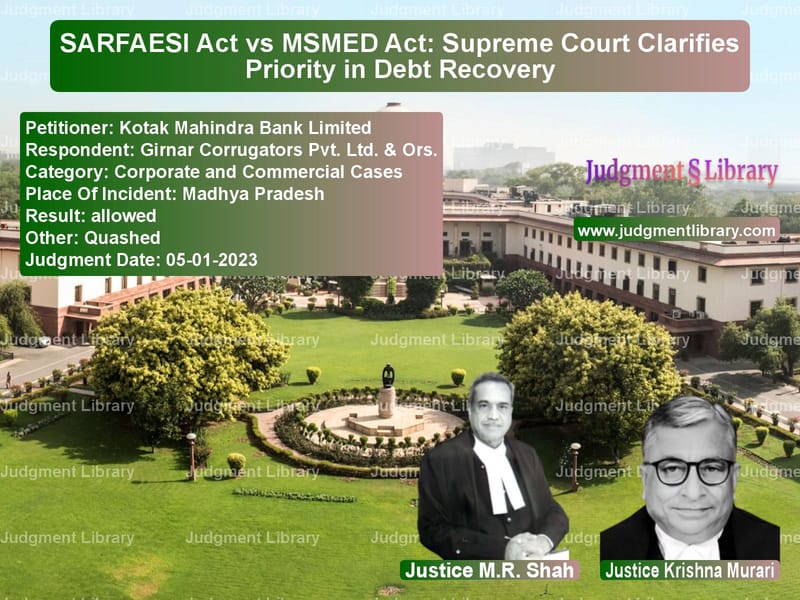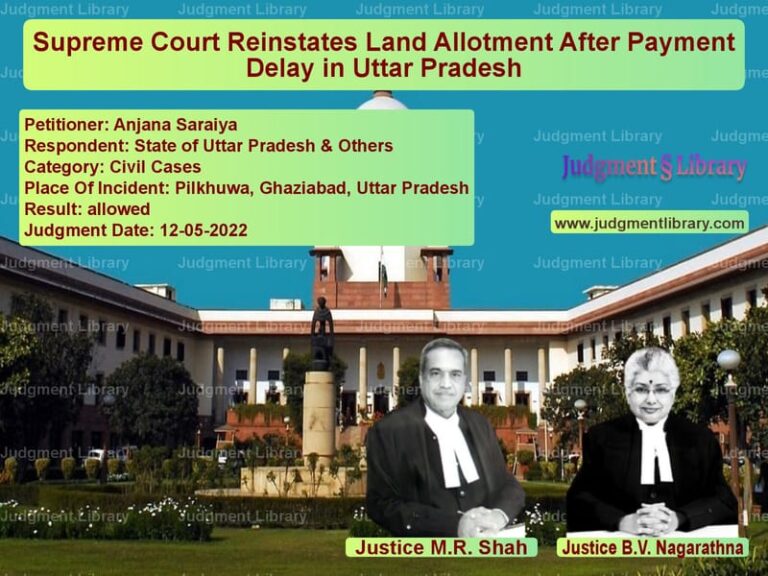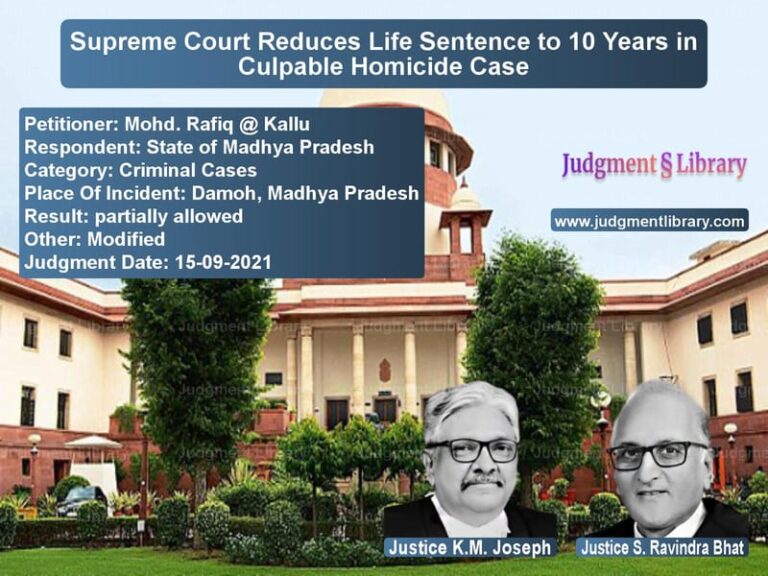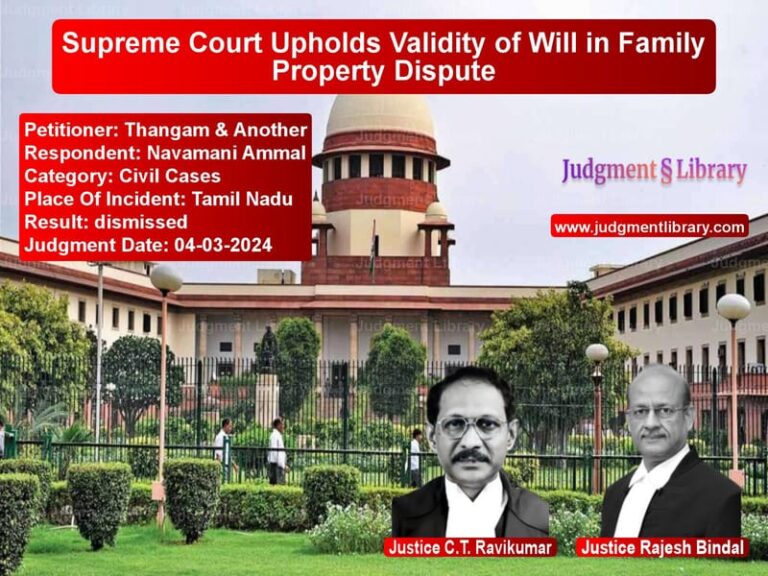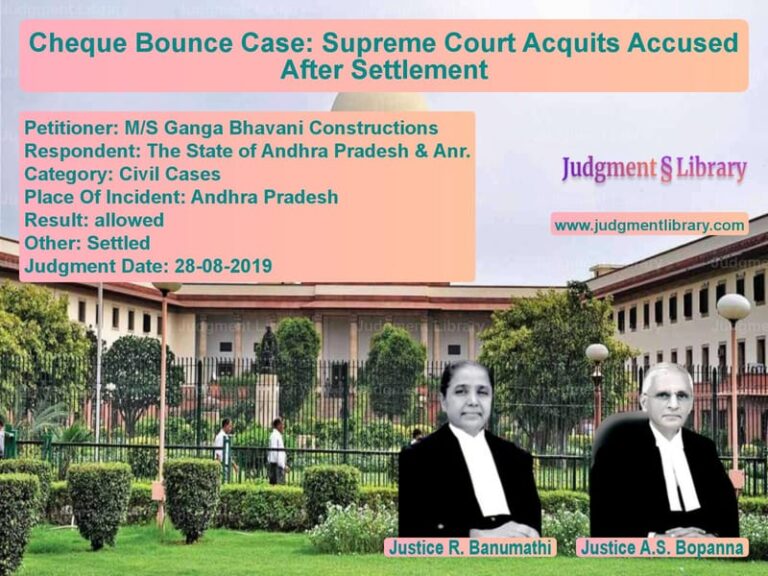SARFAESI Act vs MSMED Act: Supreme Court Clarifies Priority in Debt Recovery
The case of Kotak Mahindra Bank Limited v. Girnar Corrugators Pvt. Ltd. & Ors. deals with a crucial legal question: whether the Micro, Small and Medium Enterprises Development Act, 2006 (“MSMED Act”) takes precedence over the Securitisation and Reconstruction of Financial Assets and Enforcement of Security Interest Act, 2002 (“SARFAESI Act”) when it comes to debt recovery and enforcement of security interests. The Supreme Court was called upon to resolve conflicting interpretations regarding the priority of debts owed to financial institutions versus those owed to MSMEs.
Background of the Case
The dispute arose when the Division Bench of the High Court of Madhya Pradesh ruled in favor of an MSME entity, holding that the MSMED Act prevails over the SARFAESI Act. This decision effectively meant that an award passed by the Facilitation Council under the MSMED Act would have priority over the rights of secured creditors under the SARFAESI Act.
Kotak Mahindra Bank, the secured creditor in this case, challenged the High Court’s ruling, arguing that the SARFAESI Act should have overriding authority, particularly after the introduction of Section 26E in 2016, which provides for priority of secured creditors in debt recovery.
Legal Issues Considered
The Supreme Court examined the following key legal issues:
- Whether the MSMED Act prevails over the SARFAESI Act in debt recovery matters.
- Whether recovery proceedings initiated under the MSMED Act can override secured creditors’ rights under SARFAESI.
- The legal effect of Section 26E of the SARFAESI Act, which was introduced through an amendment in 2016.
- Whether the Facilitation Council’s award under the MSMED Act has priority over secured debts.
Arguments by the Appellant (Kotak Mahindra Bank)
Kotak Mahindra Bank, the secured creditor, put forth the following arguments:
- The SARFAESI Act, particularly after the 2016 amendment, provides clear priority to secured creditors under Section 26E.
- The MSMED Act does not contain any explicit provision that gives priority to debts under its recovery mechanism over secured debts.
- Sections 15 to 23 of the MSMED Act merely provide for a special mechanism to resolve disputes but do not grant overriding priority over secured creditors’ rights.
- The High Court’s reliance on the MSMED Act as a later enactment was misplaced, as the 2016 amendment to the SARFAESI Act came after the MSMED Act, reinforcing secured creditors’ priority.
- Allowing MSME debts to take priority over secured debts would make the SARFAESI Act ineffective and contradict its legislative intent.
Arguments by the Respondents (Girnar Corrugators Pvt. Ltd.)
The respondents, who were the MSME claimants, countered with the following arguments:
- The MSMED Act is a beneficial legislation designed to protect small enterprises and should therefore take precedence over debt recovery laws.
- Section 24 of the MSMED Act contains a non-obstante clause, meaning that it overrides conflicting provisions in any other law, including the SARFAESI Act.
- The Facilitation Council’s awards are in the nature of a decree and should be treated as having higher enforceability than ordinary debt claims.
- The MSMED Act applies specifically to MSME debts, whereas the SARFAESI Act is a broader financial legislation; therefore, the more specific law (MSMED Act) should prevail.
- Financial institutions have multiple avenues for recovery, such as the Insolvency and Bankruptcy Code (IBC), whereas MSMEs rely solely on the recovery mechanism under the MSMED Act.
Supreme Court’s Judgment
The Supreme Court ruled as follows:
- The SARFAESI Act takes priority over the MSMED Act in debt recovery matters. The Court held that Section 26E of the SARFAESI Act, which was introduced through an amendment in 2016, explicitly gives priority to secured creditors.
- No express provision in the MSMED Act grants priority. The Court found that while the MSMED Act contains provisions for resolving MSME disputes, it does not establish a hierarchy of debt recovery that supersedes secured creditors’ rights.
- Section 26E of SARFAESI Act has an overriding effect. The Court emphasized that this section, being introduced later in time, specifically provides priority to secured creditors, making it superior to general debt recovery provisions.
- Facilitation Council’s awards do not override secured creditors’ rights. The Court ruled that while an MSME may recover debts through Facilitation Council proceedings, such recoveries do not take precedence over secured debts under the SARFAESI Act.
- Overruling the High Court’s judgment. The Supreme Court quashed the High Court’s ruling, holding that the SARFAESI Act governs secured debts and takes precedence over MSME-related debt recovery proceedings.
Analysis of the Judgment
The ruling provides clear guidance on the interaction between the SARFAESI Act and the MSMED Act, reinforcing the principle that secured creditors are given priority in debt recovery proceedings.
Implications for Secured Creditors
- Financial institutions can enforce security interests without concern that MSME claims will take precedence.
- Credit recovery mechanisms under SARFAESI remain robust, ensuring predictability for banks and lenders.
- Secured creditors maintain the right to recover debts under Section 26E, reinforcing their financial security.
Implications for MSMEs
- MSMEs can still recover debts under the MSMED Act but cannot claim priority over secured creditors.
- The Facilitation Council’s awards will remain enforceable but will not supersede secured debt claims.
- MSMEs may need to explore alternative financial mechanisms, such as factoring, to mitigate payment delays.
Implications for the Legal System
- This ruling clarifies the scope of debt recovery laws and prevents legal conflicts between financial statutes.
- Courts now have a definitive precedent to follow in cases involving conflicting claims between SARFAESI Act and MSMED Act.
- The decision reinforces the legislative intent behind Section 26E, ensuring its effective application.
Conclusion
The Supreme Court’s judgment in this case establishes that secured creditors under the SARFAESI Act have priority over MSME creditors under the MSMED Act. This ruling prevents conflicting interpretations of debt recovery laws and ensures that financial institutions can enforce security interests without disruption. By clarifying the hierarchy of debt obligations, the Court has reinforced the stability and reliability of India’s financial and banking system.
Petitioner Name: Kotak Mahindra Bank Limited.Respondent Name: Girnar Corrugators Pvt. Ltd. & Ors..Judgment By: Justice M.R. Shah, Justice Krishna Murari.Place Of Incident: Madhya Pradesh.Judgment Date: 05-01-2023.
Don’t miss out on the full details! Download the complete judgment in PDF format below and gain valuable insights instantly!
Download Judgment: kotak-mahindra-bank-vs-girnar-corrugators-p-supreme-court-of-india-judgment-dated-05-01-2023.pdf
Directly Download Judgment: Directly download this Judgment
See all petitions in Bankruptcy and Insolvency
See all petitions in Corporate Compliance
See all petitions in unfair trade practices
See all petitions in Judgment by Mukeshkumar Rasikbhai Shah
See all petitions in Judgment by Krishna Murari
See all petitions in allowed
See all petitions in Quashed
See all petitions in supreme court of India judgments January 2023
See all petitions in 2023 judgments
See all posts in Corporate and Commercial Cases Category
See all allowed petitions in Corporate and Commercial Cases Category
See all Dismissed petitions in Corporate and Commercial Cases Category
See all partially allowed petitions in Corporate and Commercial Cases Category

